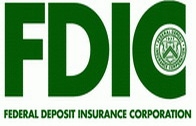Advertisement
FDIC Proposes Implementation of Dodd-Frank Assessment Changes

The Board of Directors of the Federal Deposit Insurance Corporation (FDIC) has approved two proposed rules that would amend the deposit insurance assessment regulations. The first would implement a provision in the Dodd-Frank Wall Street Reform and Consumer Protection Act that changes the assessment base from one based on domestic deposits (as it has been since 1935) to one based on assets. The second proposal would re-propose changes for the deposit insurance assessment system for large institutions given Dodd-Frank's changes to the assessment base. This proposal replaces a proposed rule approved by the Board in April.
In accordance with a provision in Dodd-Frank, the FDIC is proposing to change the assessment base from adjusted domestic deposits to average consolidated total assets minus average tangible equity.
Since the new base would be much larger than the current base, the FDIC is also proposing to lower assessment rates, which achieves the FDIC's goal of not significantly altering the total amount of revenue collected from the industry.
"I believe that this proposal achieves the goals of the Dodd-Frank Act to change the assessment base to better reflect risks to the deposit insurance fund," said FDIC Chairman Sheila C. Bair. "While the change in the assessment base affects the amounts paid by individual institutions, this proposed rule is designed to keep the total amount collected from the industry very close to unchanged. This proposal will align with the restoration plan recently approved by the Board to reflect the higher reserve ratio required under Dodd-Frank."
The second assessment-related item replaces a proposed rule revising the deposit insurance assessment system for large institutions that was approved by the FDIC on April 13, 2010. The proposal approved today by the Board would eliminate risk categories and debt ratings from the assessment calculation for large banks and would instead use scorecards. The scorecards would include financial measures that are predictive of long-term performance. A large financial institution would continue to be defined as an insured depository institution with at least $10 billion in assets.
"In response to comments on the April NPR and in light of the statutory change to the assessment base, it makes sense to reissue the large bank proposal," said Chairman Bair. "In connection with the NPR on the assessment base, we have proposed adjusting the treatment of brokered deposits and unsecured liabilities and eliminating higher rates associated with excessive reliance on secured funding. In addition, as with the April proposal, we have revamped the large bank premium system to focus on risk over the entire credit cycle. Over the long term, institutions that pose higher risk would pay higher assessments when they assume these risks rather than when conditions deteriorate. During the crisis, it became clear that our large bank pricing metrics were lagging indicators of financial deterioration, to a greater extent than the metrics we use for smaller institutions."
Both proposals will have a 45-day comment period upon publication in the Federal Register. The FDIC is also proposing that both changes in the assessment system be effective as of April 1, 2011.
For more information, visit www.fdic.gov.
About the author




